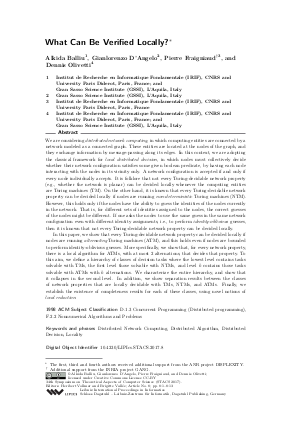What Can Be Verified Locally?
Authors Alkida Balliu, Gianlorenzo D'Angelo, Pierre Fraigniaud, Dennis Olivetti
-
Part of:
Volume:
34th Symposium on Theoretical Aspects of Computer Science (STACS 2017)
Part of: Series: Leibniz International Proceedings in Informatics (LIPIcs)
Part of: Conference: Symposium on Theoretical Aspects of Computer Science (STACS) - License:
 Creative Commons Attribution 3.0 Unported license
Creative Commons Attribution 3.0 Unported license
- Publication Date: 2017-03-06
File

PDF
LIPIcs.STACS.2017.8.pdf
- Filesize: 0.54 MB
- 13 pages
Document Identifiers
Subject Classification
Keywords
- Distributed Network Computing
- Distributed Algorithm
- Distributed Decision
- Locality
Metrics
- Access Statistics
-
Total Accesses (updated on a weekly basis)
0PDF Downloads0Metadata Views
Abstract
We are considering distributed network computing, in which computing entities are connected by a network modeled as a connected graph. These entities are located at the nodes of the graph, and they exchange information by message-passing along its edges. In this context, we are adopting the classical framework for local distributed decision, in which nodes must collectively decide whether their network configuration satisfies some given boolean predicate, by having each node interacting with the nodes in its vicinity only. A network configuration is accepted if and only if every node individually accepts. It is folklore that not every Turing-decidable network property (e.g., whether the network is planar) can be decided locally whenever the computing entities are Turing machines (TM). On the other hand, it is known that every Turing-decidable network property can be decided locally if nodes are running non-deterministic Turing machines (NTM). However, this holds only if the nodes have the ability to guess the identities of the nodes currently in the network. That is, for different sets of identities assigned to the nodes, the correct guesses of the nodes might be different. If one asks the nodes to use the same guess in the same network configuration even with different identity assignments, i.e., to perform identity-oblivious guesses, then it is known that not every Turing-decidable network property can be decided locally. In this paper, we show that every Turing-decidable network property can be decided locally if nodes are running alternating Turing machines (ATM), and this holds even if nodes are bounded to perform identity-oblivious guesses. More specifically, we show that, for every network property, there is a local algorithm for ATMs, with at most 2 alternations, that decides that property. To this aim, we define a hierarchy of classes of decision tasks where the lowest level contains tasks solvable with TMs, the first level those solvable with NTMs, and level k contains those tasks solvable with ATMs with k alternations. We characterize the entire hierarchy, and show that it collapses in the second level. In addition, we show separation results between the classes of network properties that are locally decidable with TMs, NTMs, and ATMs. Finally, we establish the existence of completeness results for each of these classes, using novel notions of local reduction.
Cite As Get BibTex
Alkida Balliu, Gianlorenzo D'Angelo, Pierre Fraigniaud, and Dennis Olivetti. What Can Be Verified Locally?. In 34th Symposium on Theoretical Aspects of Computer Science (STACS 2017). Leibniz International Proceedings in Informatics (LIPIcs), Volume 66, pp. 8:1-8:13, Schloss Dagstuhl – Leibniz-Zentrum für Informatik (2017)
https://doi.org/10.4230/LIPIcs.STACS.2017.8
BibTex
@InProceedings{balliu_et_al:LIPIcs.STACS.2017.8,
author = {Balliu, Alkida and D'Angelo, Gianlorenzo and Fraigniaud, Pierre and Olivetti, Dennis},
title = {{What Can Be Verified Locally?}},
booktitle = {34th Symposium on Theoretical Aspects of Computer Science (STACS 2017)},
pages = {8:1--8:13},
series = {Leibniz International Proceedings in Informatics (LIPIcs)},
ISBN = {978-3-95977-028-6},
ISSN = {1868-8969},
year = {2017},
volume = {66},
editor = {Vollmer, Heribert and Vall\'{e}e, Brigitte},
publisher = {Schloss Dagstuhl -- Leibniz-Zentrum f{\"u}r Informatik},
address = {Dagstuhl, Germany},
URL = {https://drops.dagstuhl.de/entities/document/10.4230/LIPIcs.STACS.2017.8},
URN = {urn:nbn:de:0030-drops-70253},
doi = {10.4230/LIPIcs.STACS.2017.8},
annote = {Keywords: Distributed Network Computing, Distributed Algorithm, Distributed Decision, Locality}
}
